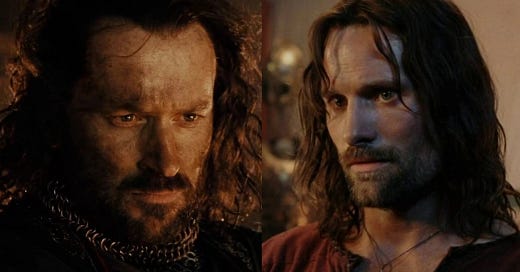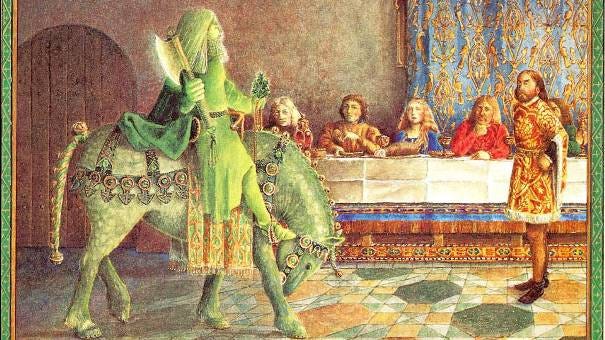In the opening scene of Gawain and the Green Knight, the eponymous emerald equestrian arrives at King Arthur’s court at the New Year’s feast looking for a champion to take up his challenge. In front of all of King Arthur’s assembled knights he outlines the proposed terms of his contest: he will give any warrior there who accepts his challenge a single uncontested swing of the axe he carries on the sole condition that the challenger agrees to receive a return swing of the axe under the same conditions a year and a day from now.
He is met with silence. Supposedly the most renowned and bravest of all the knights in all the realms, the Knights of the Round Table balk.
Equally embarrassed and angered by the taunts of the Green Knight and the silence of his own comrades, Arthur rises and moves to accept the challenge himself in order to preserve his own honor and that of his court.
But Gawain will not let this stand. He interjects before Arthur can do so and asks to accept the challenge himself, though he does not feel that he is worthy. In explaining his hesitancy to Arthur, he says of the other knights and then himself:
on earth there are, I hold, none more honest of purpose,
no figures fairer on field where fighting is waged.
I am the weakest, I am aware, and in wit feeblest,
and the least loss, if I live not, if one would learn the truth.
Only because you are my uncle is honour given me:
save your blood in my body I boast of no virtue; (36-37)1
Gawain is publicly confessing to being a nepotism baby. He feels that the only reason he’s even at the Round Table in the first place is that his mother is Arthur’s sister.
save your blood in my body I boast of no virtue
Gawain goes on to prove—both by his successes in the ensuing quest and by his failures—that he does indeed have much virtue to boast of and does deserve honour.
But Arthur’s blood in his body gives Gawain more than just a seat at the round table and virtue (in addition to his own) to boast of: it’s because of Arthur’s blood in his body that Gawain obtains a kind of immortality too. His association with Arthur is why he’s known to this day and lives on in the tales of Arthur and Camelot. This goes for the other knights of the round table too, who become part of Arthur’s extended “family” of sorts by their association with him and their brotherhood in arms.
This quote connecting Gawain’s virtue to Arthur’s blood has stuck with me in the weeks since I reread Tolkien’s translation of Sir Gawain and the Green Knight for its resonance and its contrasts with the stories of two other kingly heirs.
Aragorn son of Arathorn is the first of these two other royal figures whose lineage confers upon him a special virtue and has an impact on his mortality. Aragorn is the heir in exile of the Kings of the Dúnedain: Elendil and Isildur, High Kings of Arnor and Gondor.
Aragorn too views himself as of somewhat lesser status than his royal relations, though not quite so self-depreciating as Gawain: “Little do I resemble the figures of Elendil and Isildur as they stand carven in their majesty in the halls of Denethor. I am but the heir of Isildur, not Isildur himself,” he tells Boromir in Rivendell after Boromir expresses doubt that this ranger could indeed wield the sword of Elendil and be everything that implies (The Lord of the Rings, 248).2 It is by the blood of Elendil and Isildur that he boasts of virtue.3
Keep reading with a 7-day free trial
Subscribe to Jokien with Tolkien to keep reading this post and get 7 days of free access to the full post archives.





